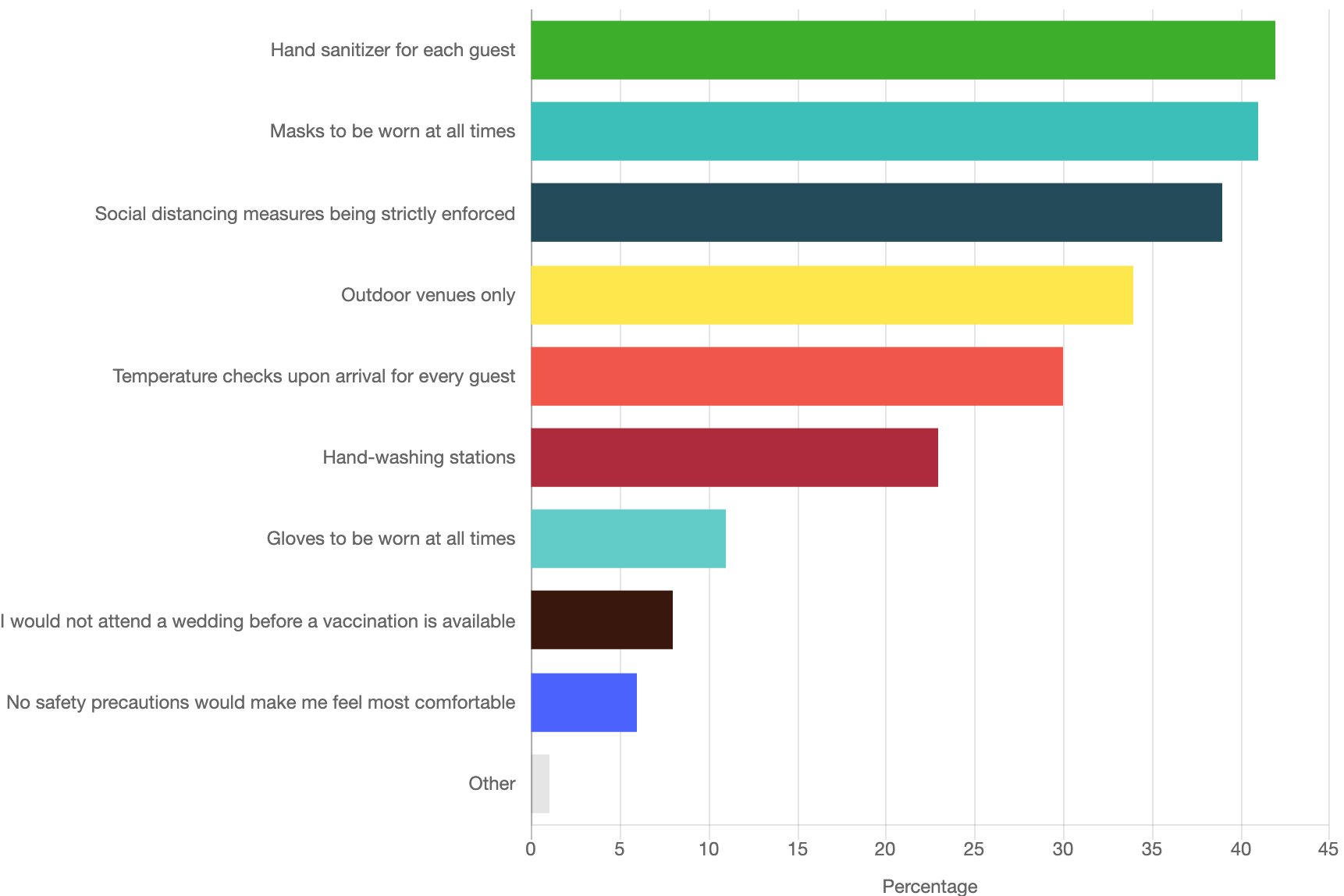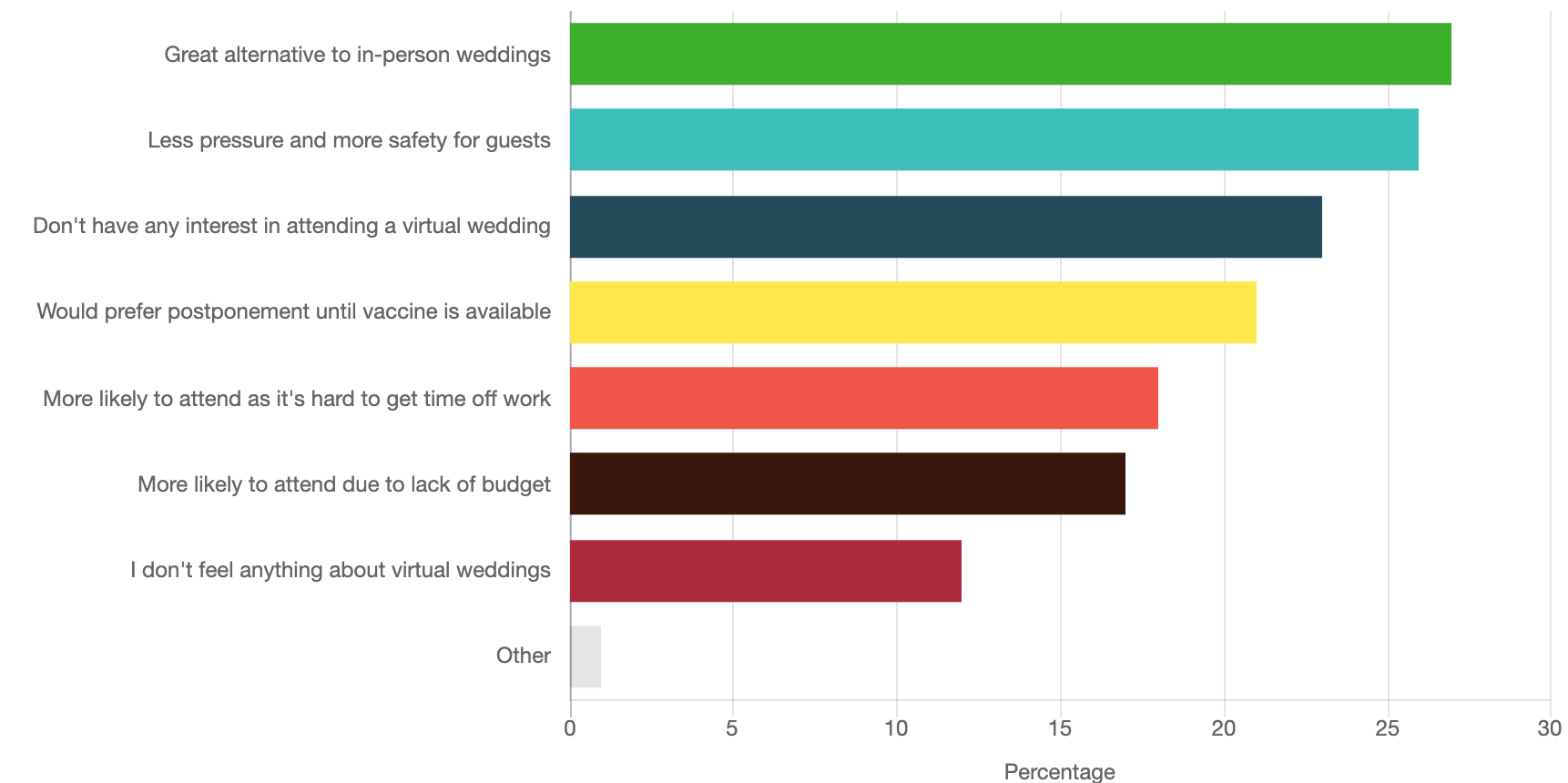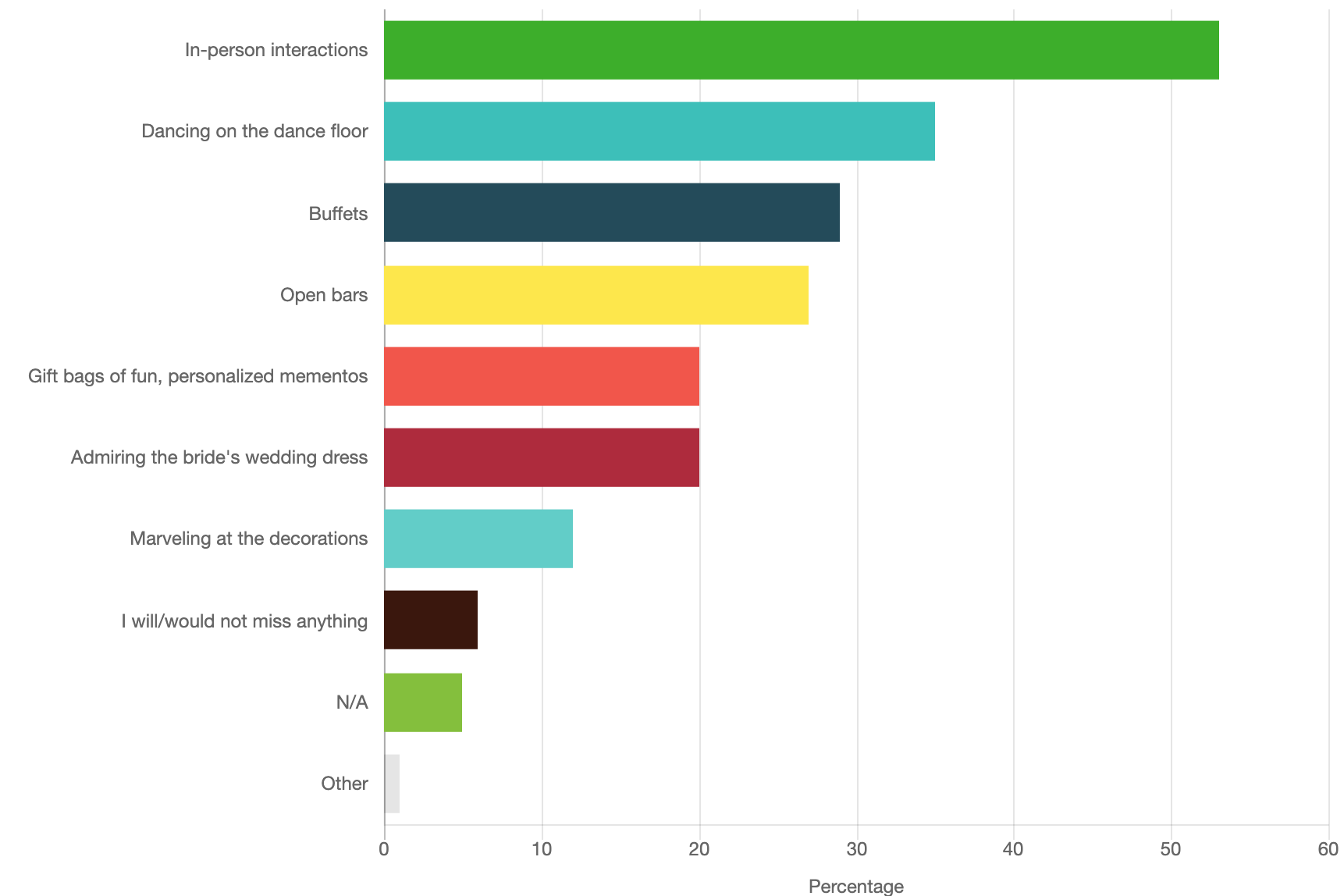The Future of Weddings: These COVID-19 Preferences May Surprise You
If you or a friend or family member had a wedding planned any time between March of 2020 and, well, now, you noticed that weddings changed immediately when COVID-19 became our reality. Regardless of how couples might feel about the pandemic, local and regional ordinances and state levels of lockdown determined how and where weddings could happen.
Of course, weddings still needed to happen. Couples turned to the alternatives of small, in-home or small venue events, virtual weddings, or postponing the ceremony altogether. What would guests prefer? What would entice them to attend a wedding, either in person or virtually?
To discover more about what the “new normal” of weddings might look like, my team and I surveyed 1,049 individuals in the United States regarding their comfort level with attending a wedding, how far they would travel to attend one, and much more. The survey was conducted on June 25 and 26th of 2020, so the timing definitely impacted some of the answers.
The In-Person Wedding Still Rules
First, we will start with the fact that although the virtual wedding is an option, most guests would not Zoom, er, rush to attend that kind of ceremony. In fact, 21% of respondents said they would prefer that the couple delay the wedding rather than hold a virtual one.
However, at the time of this survey, 83% of those surveyed said they would prefer not to fly. A majority, 51% would not travel more than 200 miles from home to attend a wedding. This is in large part due to travel restrictions and the hassle of travel. In August of 2020, the TSA screened only 31% of the percentage of travelers it did in August of 2019.
When will people be comfortable flying again or traveling farther for weddings? Barring a vaccine, the most cautious group includes those 55 and over, of which 30% would prefer to wait 11 months or more before attending a wedding.
You Can Make Guests Feel More Comfortable Attending In-Person
There are a lot of opinions about masks, social distancing, and more. Spending five minutes on social media, or if you are more daring, sharing your own opinion, will show you exactly how divided people are.
Truth be told people are simply going out less, and if you mention a large group of people in an enclosed indoor space, you’ll get a similar reaction. Most people just don’t feel comfortable, at least not yet.
But what if you took precautions? You can make guests feel more comfortable in a couple of ways:

- 30% favored temperature checks for every attendee at the door.
- 39% favored social distancing being enforced.
- Only 11% favored gloves being worn all the time.
- 41% preferred that everyone mask up.
- 34% preferred an outdoor venue.
- 42% preferred hand sanitizer for each guest.
- 23% favored handwashing stations.
There are other creative ways as well. Some companies have started to develop wristbands for various events. While they could be created in different colors, a simple guide is those used in a stoplight. For example, wristbands could stand for:
- Red: I’m at risk and uncomfortable. Don’t get too close, please.
- Yellow: I’m okay but being cautious. Please stay six feet away and/or mask up.
- Green: I’m totally comfortable and here for hugs.
Guests would be given a guide to the colors and asked to respect the wishes of others.
The takeaway: there are ways to make your guests feel more comfortable attending an in-person wedding. Not sure how everyone feels? Take a survey of your potential guests as part of the invitation process.
Virtual Weddings May Be Here to Stay
Since March, we are digitally doing everything from board meetings to birthday parties. Some couples have also opted for virtual weddings.
The concept certainly has a lot of merit. Guests who live at a distance and could not otherwise attend for a variety of reasons can witness the ceremony and really feel like a part of it.
When respondents were asked, “How do you feel about virtual weddings?” and allowed to select more than one answer, here is how the list broke down:
- 27% think they are a great alternative to in-person weddings.
- 17% are more likely to attend virtually because of budget concerns and the cost of attending in person.
- 18% are more likely to attend virtually because they wouldn’t be able to take time off work to attend in person.
- 26% said virtual weddings take the pressure off guests and show them the couple cares about their safety.
- 21% say they’d rather the couple postpone the wedding than have a virtual one.
- 23% would have no interest in attending a virtual wedding.
- 12% really have no feelings about virtual weddings.
There is a clear division between those who like the idea of virtual weddings and those who don’t. Could you entice them to attend virtually? Sure, and there are a lot of creative ideas like asking guests to dress up, live streaming dance music, and even sending catered meals or cocktails to attendees’ homes so they can “share a meal” with other guests.
“Seriously, there are tons of ways to make these virtual ceremonies fun. First off, they are novel on their own. Sure, many of us are Zoom-ed out, but there’s a new excitement around a wedding and seeing everyone gathered from around the city or the world,” Hope Merlis of A More Perfect Union says, “I have seen some couples ask each of the attendees to introduce themselves, as well as each give blessings to the couple before I pronounce them married.”
But there are some pros and cons to going remote with your wedding.
The Pros and Cons of Going Remote
So first, the pros of going remote include some pretty impressive things. Think about how much larger your guest list could be, and how many more people can “attend.” The money your guests save on travel can be put toward gifts…
Think about the number of guests who would not be able to get time off work or afford to travel who could “be there” for a virtual ceremony. This flexibility is a major pro. So what’s the problem?
The primary thing lacking in virtual weddings is the guest experience. What would people miss most about in-person weddings?
- 53% miss hugs and interacting with the bride and groom, family, and friends.
- 35% miss dancing on the dance floor, although there could be a social distancing option in that case.
- 29% miss buffets, likely not coming back any time soon.
- 27% miss open bars, primarily male respondents. Who doesn’t miss free booze?
- 12% miss the decorations.
- 20% miss ogling the bride’s dress.
- 20% miss swag and gift bags, those fun wedding keepsakes.
- Nearly 6% don’t miss anything about in-person weddings. This percentage is a quick way to trim your guest list.
In short, the survey tells us that respondents prefer in-person weddings but prefer to remain close to home and avoid air travel. The older crowd, in other words, the couple’s parents and their friends, are even more cautious.
Is there a way to offer a guest experience? There are the things mentioned above: dressing up, streaming live music, etc. You can also cook with your guests.
“Consider selecting an assortment of recipes they can cook for your virtual reception. Give guests a heads up [...] to give them a chance to stock their pantry, freezers, and fridges with the ingredients. Suggest recipes that mean something to you as a couple." Ivy Summer says in her bookPoise over Panic: How to Plan a Wedding During a Pandemic. “Give guests a time range for suggested cooking or baking in their own kitchen. This informs a sense of the duration and flow of the event.”
You can overcome the cons of holding a virtual wedding, but sadly 23% of those surveyed said they would have no interest in attending a virtual wedding.
The Blended Wedding Option
Do couples have to choose? Not necessarily. You can hold an in-person ceremony as soon as your jurisdiction allows it, or you can hold a small in-person ceremony, but also stream it for those who cannot attend for whatever reason.
Even pre-COVID, offering live streaming for weddings was an emerging trend. It’s all a bit tech-heavy, but if you want to go all out, you can make the virtual wedding a truly immersive experience.
You can stream your wedding in Virtual Reality with 3D cameras.
You can have your wedding produced, like a television show, with cuts to different cameras and angles. How many cameras? Two, four, or nineteen? The limit is only as high as your budget, and the number of cameras the space will accommodate.
You could even have commentators do your wedding just like sporting events. Just don’t pick Joe Buck. Nobody likes his football commentary, so he could really detract from your wedding.
What’s Next?
Things have changed, even since this survey was taken. In some areas, restrictions have been relaxed. In others, they have gotten stricter, or released for a while and then went back to lockdown status. Until we have a vaccine or widespread immunity, we will be living with COVID, not living after COVID.
But will things change with a vaccine? What the new normal for weddings will look like is hard to say. It seems that virtual and blended weddings are here to say. In-person weddings are not going away anytime soon. Rather than virtual weddings replacing them, the two are more likely to integrate into something different.
The global COVID pandemic has revealed that we can do things differently, and we should. The wedding of tomorrow will likely be enhanced by technology, attended from much further away, but will always be about the same thing: a couple, declaring their love and devotion for one another in front of friends and family. After all, that’s what weddings are all about anyway.


